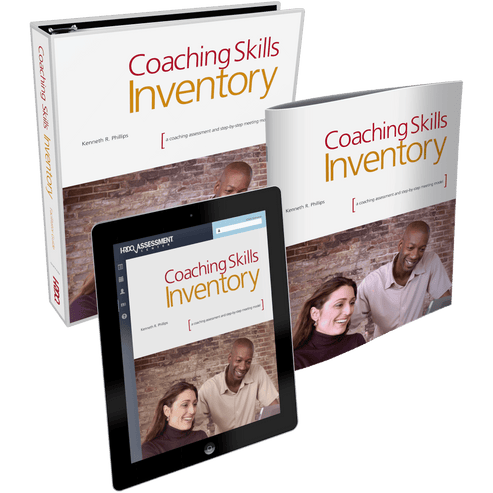Share
Essential Coaching Skills For Managers & Supervisors
Bradford R. GlaserEffective coaching skills are a key to employee success. It's no surprise that many managers see themselves as good coaches, yet studies show that most managers don't understand what coaching really is, confusing it with micromanaging their employees or telling them what to do.
In the long run, this can hurt your employees and your organization with effects like lower productivity, increased turnover, manager burnout, decreased employee morale, and more.
Looking to raise your coaching game? We'll cover essential coaching skills for leaders, managers, and supervisors, along with strategies you can use to effectively apply these skills to your team.
Let's get started!

- Identify strengths and trouble spots
- Conduct effective coaching meetings
- Measure coaching skills development
Table of Contents
What Is Coaching?

In the 1970s, Timothy Gallwey wrote The Inner Game of Tennis, detailing how to overcome mental barriers in order to achieve peak performance. John Whitmore brought Gallwey's approach to the workplace two decades later with his book, Coaching for Performance.
Coaching is a process of helping employees develop their full potential by identifying and removing obstacles that hinder effective performance. At its core, coaching isn't about teaching, managing, or directing. It's about helping people to learn on their own so that they can perform their best.
Shifting into a coaching mindset can be challenging, especially for managers. You'll have to step back from being directive and allow your employees to work their way toward their own solutions with your support.
As John Whitmore explains in Coaching for Performance, “In the workplace, when the advice is a command, ownership is at zero, and this can lead to resentment, surreptitious sabotage, or ownership of the reverse action.” This emphasizes the importance of managers and supervisors adopting a coaching or mentoring role rather than attempting to exert authoritarian control over their team.
Essential Coaching Skills
So, what traits or skills do the most effective coaches in the workplace exhibit? Let’s take a look:
- Listening. The best coaches possess exceptional active listening skills, providing their mentees with undivided attention.
- Empathy. Powerful coaches can put themselves in their mentees' shoes. Empathetic leaders can tap into the root of conflict and work out solutions with both the organization’s and mentees' needs in mind.
- Enabling others. Great coaches understand that trying to solve problems for others won’t help them grow. They resist the temptation to manage or direct others and instead empower their employees to solve problems independently.
- Supportive. Effective coaches are more than guides or advisors – they’re trusted friends. They earn the respect and trust of those they work with, making the entire coaching process flow more smoothly.
- Encouraging reflection. Effective coaches know that resolving a problem often takes deep reflection. They ask insightful, open-ended questions that prompt employees to think through their situation from many different angles.
- Results-oriented. Successful coaches are committed to helping their people grow. However, they’re equally focused on achieving strong business outcomes. They work with their employees to identify goals that can move the organization forward – and collaborate to achieve them.
Strategies to Put Your Coaching Skills to Work

Let's take a look at some strategies for creating effective coaching relationships in the workplace.
Build Positive Relationships
There's no getting around it: people take coaching better from those they like and trust. Managers and supervisors need to take the time to get to know their employees as individuals and build a positive rapport.
As your relationship progresses, show empathy. Things won't always go perfectly. Show patience and understanding. Your employees will find it easier to discuss missteps with you when they know that your top priority is helping them grow and develop.
Set Goals
When you start coaching an employee, you'll both have areas you'd like to focus on. Get everything out on the table and work with your employees to identify areas for growth.
Once you have areas to target, set specific, actionable goals that you'll work toward together. Work with your employees to identify clear, achievable steps that they can take to achieve this goal. By making the process collaborative, you'll both be invested in the plan's success and can gain a deeper understanding of each other's working styles.
Ask Questions
Helping your employees gain greater self-awareness and a deeper understanding of their situation is one of your most important priorities as a coach. The best way to do that is to ask open-ended questions that prompt reflection.
The most useful questions typically help the employee examine their own performance. If the employee appears uncertain about what to do next, if you notice a mismatch between words and actions, or if you observe a gap between current and desired performance, these can all be great opportunities to ask reflective questions.
Recognize Strengths
At first, it seems natural for a manager or supervisor to approach coaching by targeting an employee's weak areas and seeking ways to improve them. But a strengths-based approach is often more successful. Strengths-based coaches focus on employees’ strengths, leveraging them to help the employee overcome limitations and weaknesses.
Strengths-based coaching is great for business. Organizations that implemented the strengths-based approach showed sales increases of up to 19%, according to a recent global study.
A strengths-based approach has been proven to have a strong impact on employee morale as well. According to the same study, 67% of employees who strongly agreed that their manager focused on their strengths were highly engaged, compared with just 2% of those who strongly disagreed.
Let the Employee Solve the Problem
Helping employees build more responsibility is one of the key skills of an effective coach. Employees should take on progressively more complex tasks independently as coaching progresses. That's what makes the directive approach to coaching so dangerous, as we mentioned earlier. Your employees may start to approach your conversations as order-takers rather than solving their own problems.
It won't be easy. Your employee may take longer to work out the solution than you would. They may need to ask a lot of questions. And when it's all over, they may land on a different solution than you would have.
Coaching takes patience. After all, you could have just told your employee what to do from the get-go. But try it for yourself. Over time, you'll find that your employees are showing more autonomy – and deriving greater satisfaction from their work.
Focus on Results
Your employees' personal growth is paramount. Being supportive, focusing on strengths, and allowing space for independent problem-solving are all crucial parts of that process. While personal growth is essential, it’s also crucial to maintain a focus on the ultimate goal: delivering exceptional results for your organization.
Check in regularly with your employees to review the goals and action steps you have set. Always be prepared to offer support that helps your employees achieve their goals. If coaching sessions run off the rails, turning into a general conversation or a venting session, redirect them to more productive topics.
Elevate Your Coaching Skills with HRDQ
Nobody is born a great coach. It's a skill that's learned over time. The best way to become a great coach is to get your elbows dirty, working with your employees one-on-one and coaching them toward success.
Build a positive relationship as a foundation, work together with your employees to set goals, enable them to take responsibility, and focus your coaching on delivering results. Organizations that offer effective coaching don't just have better employee engagement – they see higher revenue and reduced turnover.
To get started, check out Coaching Skills Inventory. This 20-minute self-assessment and accompanying workshop helps managers identify their coaching strengths and areas for improvement using a proven seven-step model. Participants respond to real-world scenarios, receive personalized feedback, and gain actionable insights to lead more effective coaching conversations.





















































